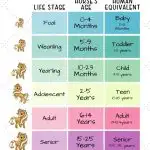You may be surprised to learn that the average horse can live quite a long time. In this article I’ll explore how many years you can expect from your equine friend; it may be more than you think!
Table of Contents
What is a Horse’s Lifespan?
A healthy horse with attentive owners can live well into its late twenties, and beyond.
The average lifespan of a horse is 25 to 30 years.
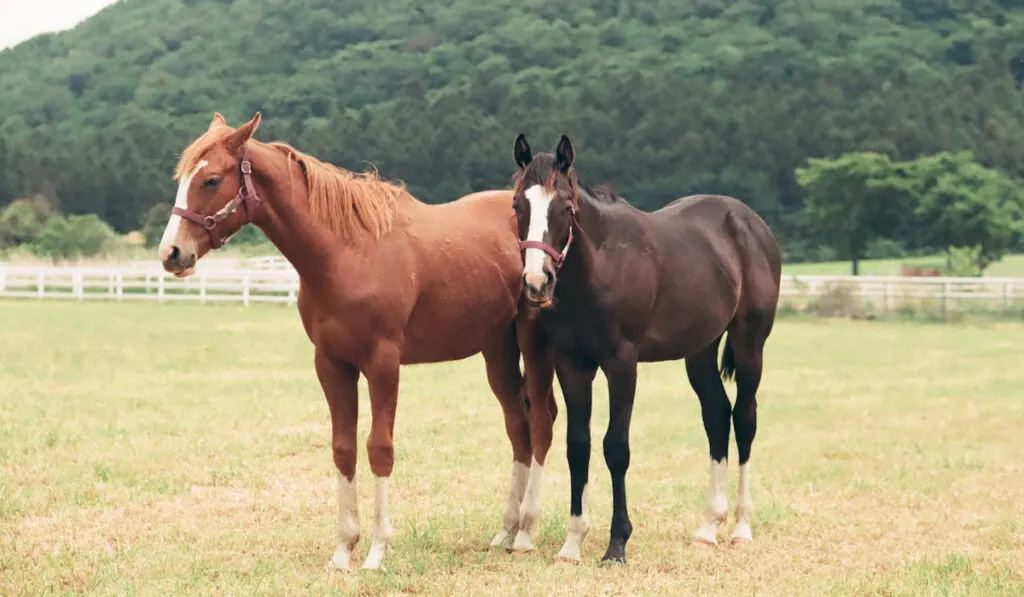
This range depends on several important factors:
- Overall health and condition.
- Breed.
- The general quality of care.
- Purpose and activities.
With the proper care and attention, a horse can make a wonderful companion for many years. But, they require additional upkeep as they age, and horse ownership can be quite a long-term commitment.
Equine enthusiasts should keep that in mind when deciding if horse ownership is right for them, and the animal’s age should be a factor in that consideration.
In our article on treating colic in horses with beer, we note that colic is the leading cause of domesticated horse deaths.
Lifespan of Large Horses vs. Small Horses
Arabians, Morgans, Quarter Horses and Appaloosas are informally known for their longevity. Pony breeds will also generally outlive their larger equine counterparts. However, between horse breeds, size matters less than genetic predisposition.
Friesians, a lighter draft horse breed, have a lower average lifespan (15-20 years) likely due to the higher rates of inbreeding, rather than their size.
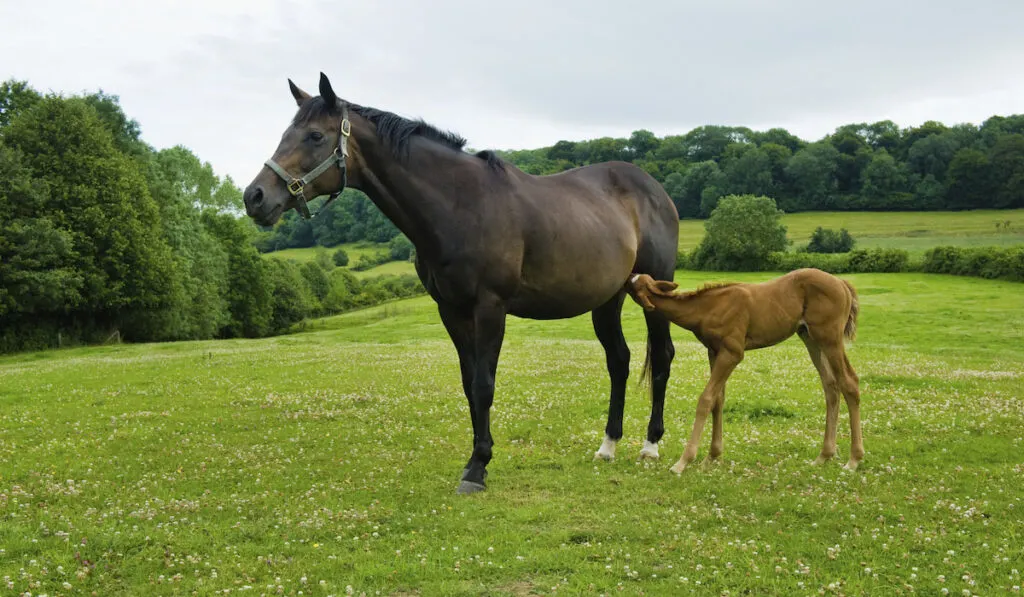
Horse Years vs. Human Years
Teenage horses are considered seniors. 5-year-old horses are adults, not babies, but how do horse years relate to human years?
It is impossible to accurately compare the ages when looking at two different species but, we can compare the physical and mental responses to age and maturity and use those as a guide.
This chart illustrates how horse years might compare to human years:
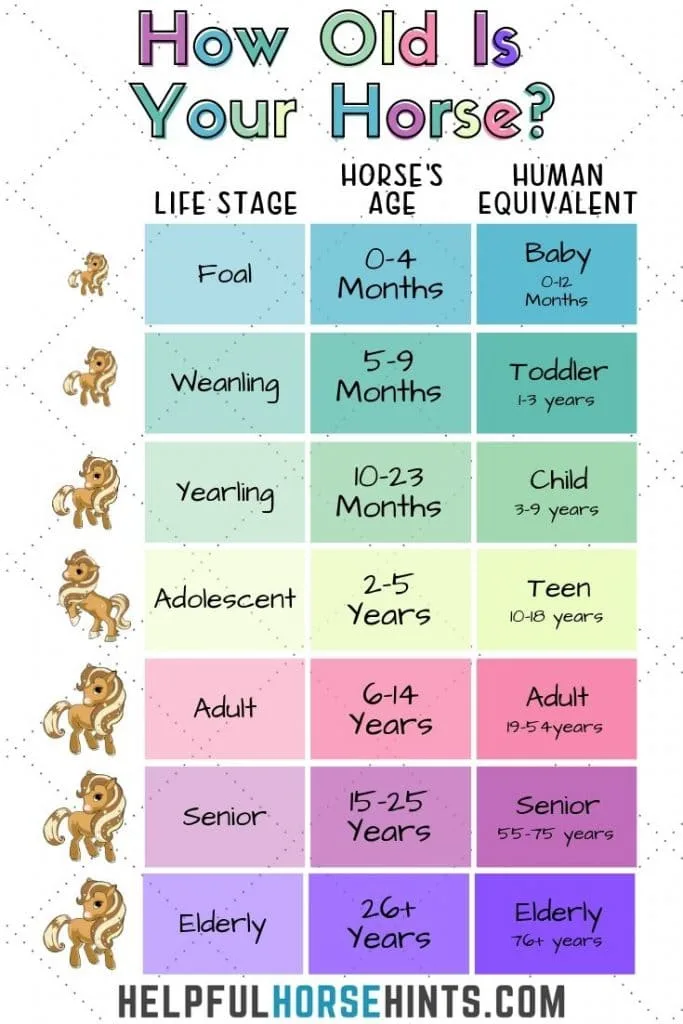
Generally speaking, a healthy horse will be able to work until its late teens to mid-twenties. Depending on the breed, condition, and purpose of the horse, this number can vary wildly. A hardworking draft horse may likely retire sooner than a pony ridden once a week.
In the first year of a horse’s life, they do a lot of maturing compared to us humans. By the end of their yearling year, they are roughly the physical and mental maturity of a 9-year-old. Still kids but old enough to start to understand things and have an independent outlook on the world.
Once horses start getting older, the adult years go by comparatively fast. Of course, all individual horses mature at different rates, so these numbers are just general estimates.
Horse Lifespan: Horse Years vs. Human Years
| Life Stage | Horse Age | Estimated Human Equivalent Age |
|---|---|---|
| Foal | 0-4 Months | 0-12 Months |
| Weanling | 5-9 Months | 1-3 Years |
| Yearling | 10-23 Months | 3-9 Years |
| Adolescent | 2 Years | 10 Years |
| Adolescent | 3 Years | 12 Years |
| Adolescent | 4 Years | 14 Years |
| Adolescent | 5 Years | 16 Years |
| Adult | 6 Years | 19 Years |
| Adult | 7 Years | 22 Years |
| Adult | 8 Years | 25 Years |
| Adult | 9 Years | 29 Years |
| Adult | 10 Years | 34 Years |
| Adult | 11 Years | 39 Years |
| Adult | 12 Years | 44 Years |
| Adult | 13 Years | 49 Years |
| Adult | 14 Years | 54 Years |
| Senior | 15 Years | 55 Years |
| Senior | 16 Years | 57 Years |
| Senior | 17 Years | 59 Years |
| Senior | 18 Years | 61 Years |
| Senior | 19 Years | 63 Years |
| Senior | 20 Years | 65 Years |
| Senior | 21 Years | 67 Years |
| Senior | 22 Years | 69 Years |
| Senior | 23 Years | 71 Years |
| Senior | 24 Years | 73 Years |
| Senior | 25 Years | 75 Years |
| Elderly | 26 Years | 76 Years |
| Elderly | 27 Years | 79 Years |
| Elderly | 28 Years | 82 Years |
| Elderly | 29 Years | 85 Years |
| Elderly | 30 Years | 88 Years |
| Elderly | 31 Years | 91 Years |
| Elderly | 32 Years | 94 Years |
| Elderly | 33 Years | 97 Years |
| Elderly | 34 Years | 100 Years |
| Elderly | 35 Years | 103 Years |
Human Life Stage vs. Horse Age
| Human Life Stage | Horse Age |
|---|---|
| Baby | 0-4 Months |
| Toddler | 5-9 Months |
| Child | 10-23 Months |
| Adolescent | 2-5 Years |
| Adult | 6-14 Years |
| Senior | 15-25 Years |
| Elderly | 26+ Years |
Horse Life Stage vs. Horse Age
| Horse Life Stage | Horse Age |
|---|---|
| Foal | 0-4 Months |
| Weanling | 5-9 Months |
| Yearling | 10-23 Months |
| Adolescent | 2-5 Years |
| Adult | 6-14 Years |
| Senior | 15-25 Years |
| Elderly | 26+ Years |
A senior horse that reaches 36 years old is roughly the equivalent of 103 in human years!
Clarification on Terminology
Keep in mind that terms like “adolescent” and “elderly” aren’t really used in the horse world. A 2-year-old is technically an adult horse, but physically and mentally they aren’t. Likewise, most any horseman is going to refer to an old horse as a “senior” and you won’t hear the term “elderly” commonly used to describe a horse no matter how old they are.
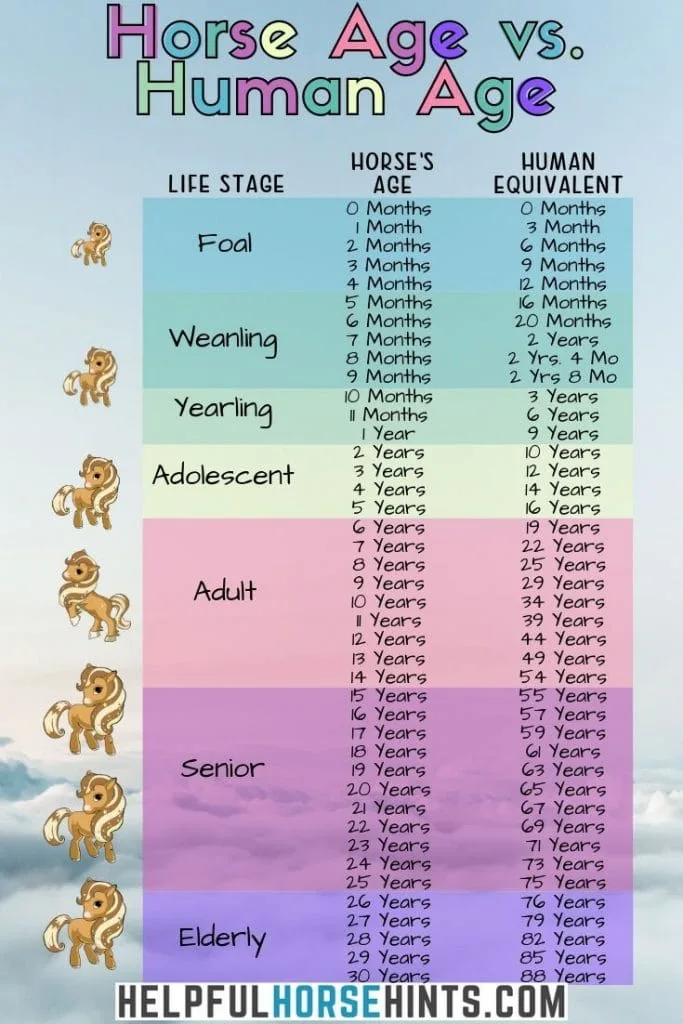
Some of the World’s Oldest Horses:
It can be tough to prove a horse or pony’s true age, as registration papers are often lost when animals change hands. A mixed breed, accidental foal or a wild-caught horse may not have papers at all. Here are some of the world record holders, verified by the Guinness Book of World Records and other official sources.
- Shayne, Irish Draught/Thoroughbred cross, 51 years old
- Orchid, Thoroughbred/Arabian cross, 50 years old.
- Badger: Arabian/Welsh cross, 51 years old.
- Sugar Puff: Shetland/Exmoor pony cross, 56 years old.
- Old Billy: draft horse, 62 years old.
Some honorable mentions:
- Oldest living horse twins: Taff and Griff, Cremello horses, 37 years old.
- Oldest living mule: Joe, 48 years old.
Determining a Horse’s Age
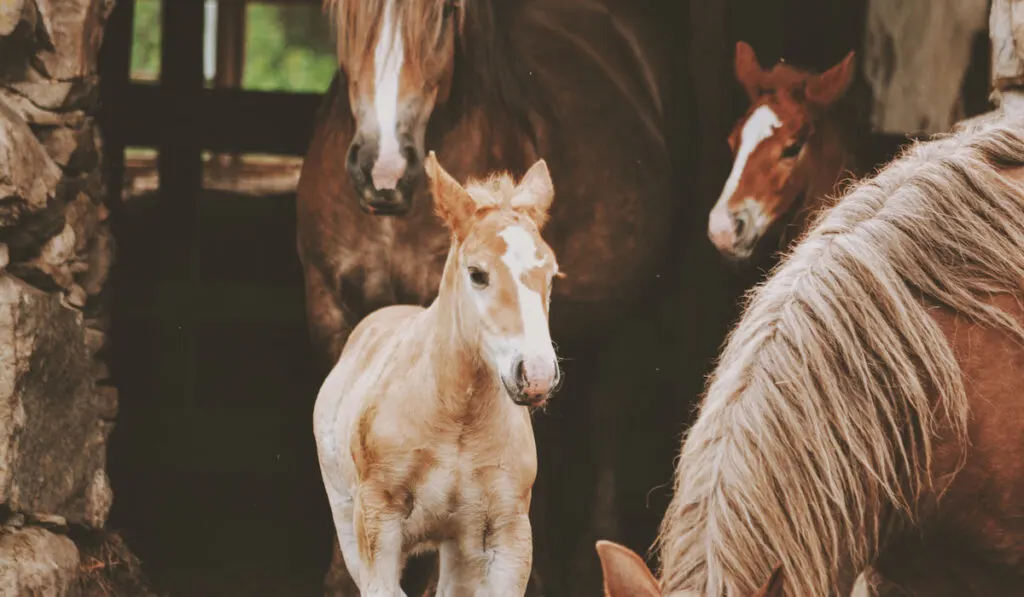
It can be difficult to figure out a horse’s age, especially for horses with unknown backgrounds. The most common way to determine a horse’s age is by examining its teeth. A veterinarian may check the teeth for the following four things:
- The appearance of permanent teeth vs. baby teeth. Horses have two sets of teeth, just like humans!
- Cup depth. Permanent teeth have deep indentations called “cups.” The depth and wear of the cups are benchmarks for age determination.
- The angle of incidence. The “angle formed by the meeting of the upper and lower incisor teeth” changes throughout a horse’s lifetime, changing the patterns of wear on the back molars.
- Size and shape. As the horse ages, the shape of the teeth changes dramatically, and it’s enough to estimate a ballpark age.
It’s not an exact science, but it’s pretty accurate.
Unscrupulous horse traders may file a horse’s cups down to present an animal that appears younger than it really is. This is called “bishoping,” and is highly unethical.
Environmental considerations should also be used to measure a horse’s age. A horse kept in a stable may appear younger, simply because it doesn’t spend as much time grazing for sandy forage as much as a range horse.
Other Signs of Aging in Horses
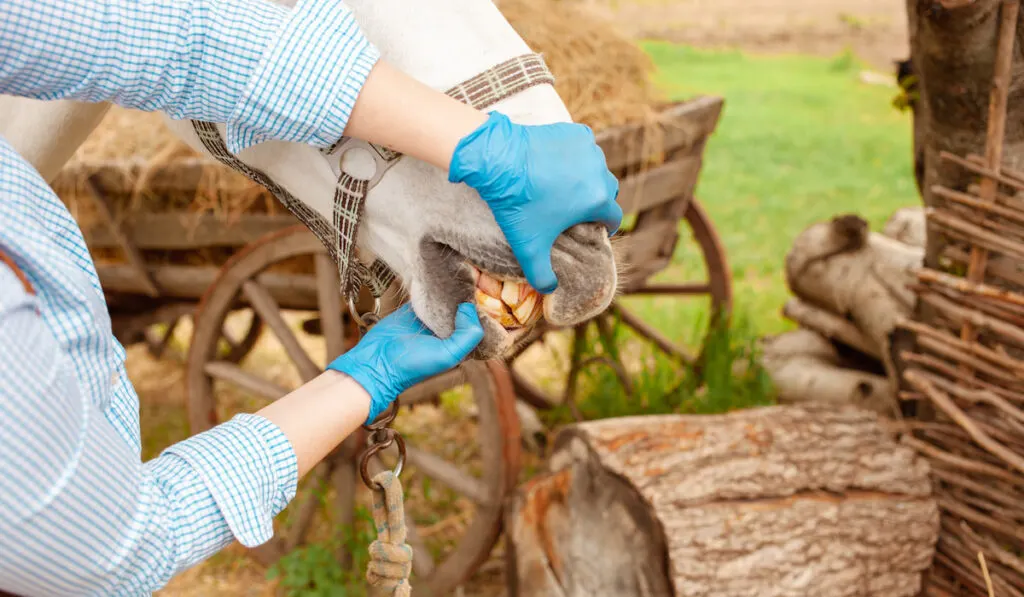
Teeth aren’t the only sign of aging.
Older horses begin to show signs of aging by the time they hit their teenage years, usually starting around 15. They will sometimes sprout gray hairs around their eyes and muzzle. These can be difficult to spot on a horse that is light-colored or already gray.
The amount of gray shown can vary from horse to horse, and it doesn’t appear at a set time so it can’t be used to reliably predict exact age.
An older horse may have looser skin and their fur might be more coarse. Because of this, their skin may take longer to heal from minor cuts and bruises, so keep a watchful eye for any injuries.
When riding, an older horse might be stiff or move more slowly, due to the weakening of the muscles in their legs and backs. A common tell-tale sign of an aging horse is lordosis, or “swayback.”
Horses with lordosis can still be ridden, but it’s important not to overload them: a horse’s back is sensitive. Many horses don’t act like they’re getting older – so it’s up to you to make sure your senior horse is staying in good shape!
Special Consideration for Keeping Older Horses
Even an older horse can be useful.
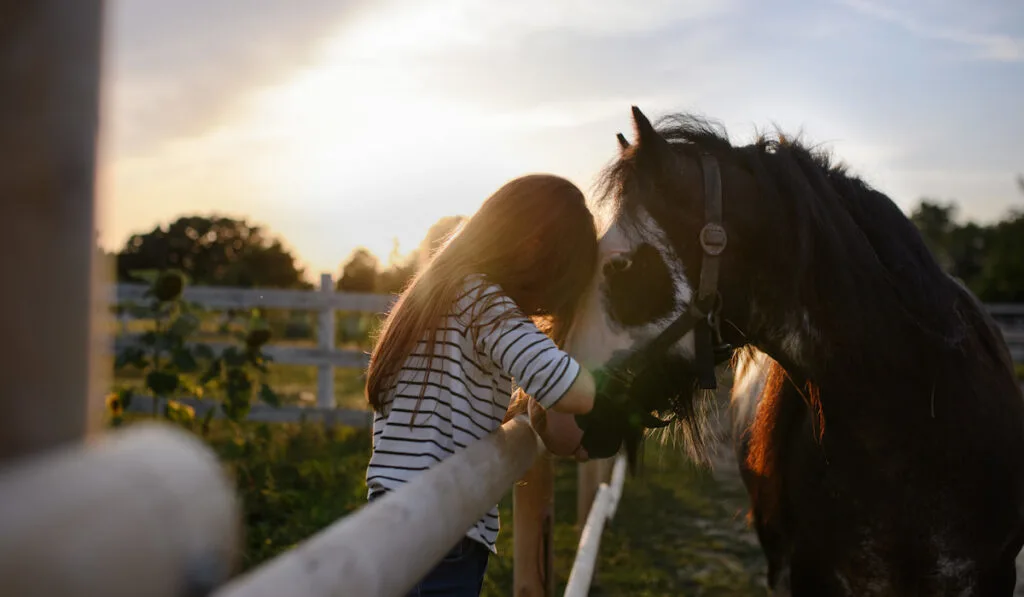
Just because a horse is older doesn’t mean it has to be put out to pasture. Plenty of horses can be ridden well into their teens and twenties. It all depends on the kind of work you’re asking your horse to do, and whether or not they are fit to do it.
A working barrel racing horse or competitive jumper may have to retire earlier than a children’s lesson horse, but every horse should be evaluated according to its lifestyle. As long as a horse is sound, happy, and willing to do his job, light exercise is good for keeping him healthy.
Older horses can require more upkeep.
It can be harder for a senior horse to stay in good condition. Sometimes they require more food, additional supplements, or medications to keep them healthy and pain-free.
Be sure to pay attention to your horse’s cues, and consult with your veterinarian about any dietary changes or supplements.
Horses Who Die From Old Age
Ideally, horses and ponies will live good lives where they are well fed and cared for until they pass naturally. Every living thing has only a limited time on earth and, as horse owners, we try our best to make sure our horse’s lives are good while they are here.
How likely is it that my horse will die from old age? Statistically speaking, only around 26% of horses over age 20 die from old age. The other 74% succumb to colic, genetic disease, injury, or other causes. (source)
How many horses make it to age 20 is an entirely different story. Horses under age 20 are euthanized for a variety of different reasons including colic, injury, respiratory problems, lameness and a variety of other issues.
This is why it’s so important to pay close attention to your horse’s behavior. If he’s not feeling good, call your veterinarian right away. Ensuring proper nutrition, dental, and hoof health are also vital in helping your companion reach a ripe old age.
Related Questions
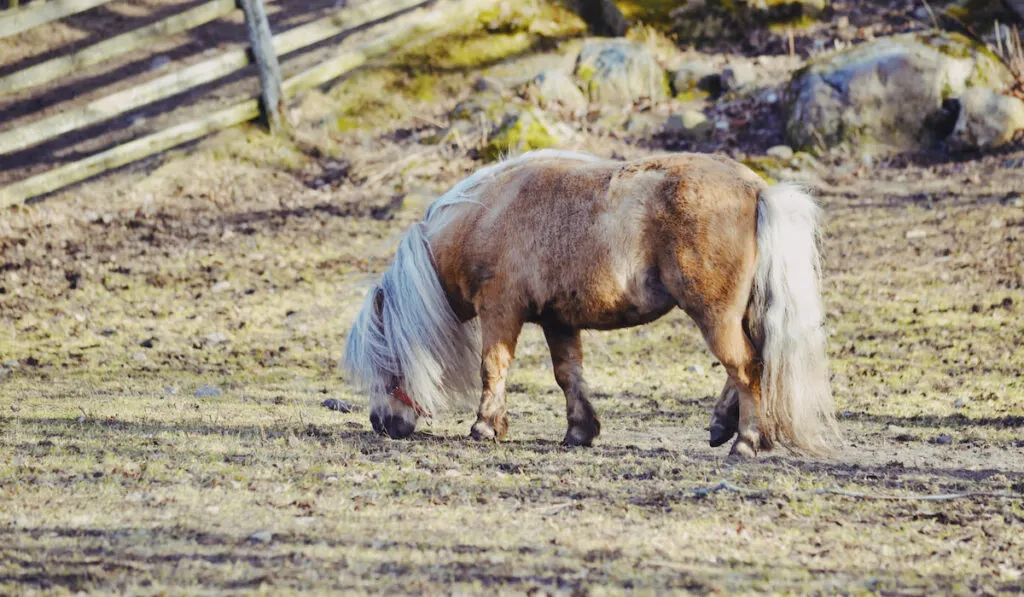
What is the average lifespan of a pony? Generally, the average lifespan of a pony is the same as a horse (25-30 years), although ponies tend to live longer.
It can be easier to keep an older pony in work, as the demands of a casual children’s lesson horse are lighter than those of an Olympic show-jumper, for example.
What breed of horse lives the longest? There are no exceptionally long-living breeds of horses or ponies, but the animals that hold world records are thoroughbred, Arabian, or pony crosses. A mixed-breed has a genetic advantage of a large breeding pool, but it’s still hard to tell how long a horse may live based on breed alone.
How do you know when it’s time to retire a horse from work? This is a deeply personal decision that is between the horse’s owner and their veterinarian. All horses are different, but even a senior horse could have many good years left. And when it is time to retire your horse, he may be perfect as a pasture pet or companion for another horse.
Are older horses good for beginners? All horses are individuals: some young horses are mellow and safe for beginners, and some seasoned senior horses will bolt at the first opportunity. Generally, an older horse has more experience. Combining a green rider with a green horse can be a gamble, and an older horse is often a safer bet.
Final Thoughts
With proper care, a horse can be a lifelong companion!
In general, your average horse will give you between 25 and 30 years of quality companionship if no accidents or illnesses occur. Owners who pay attention to their horse’s changing needs as they age may be lucky to have their friend around until their 40s. It’s always important that an aging horse receives appropriate food and is checked by a veterinarian to ensure their health is maintained.
If you liked this article, you may find the following posts interesting:
- Aging A Horse with Teeth: 20-Year-Old Arabian
- Horse Coat Color Guide – With Photos
- 26 Groundwork Exercises To Work On With Your Horse
- 10 Easy Horse Obstacles Under $20
Resources:
- https://www.yorkshirepost.co.uk/news/latest-news/happier-times-at-51-badger-is-the-world-s-oldest-horse-1-2540762
- https://articles.extension.org/pages/29999/determining-the-age-of-horses-by-their-teeth
- https://articles.extension.org/pages/10173/bishoping

